Sir Mark Rowley: Met's new commissioner 'tougher than he looks'
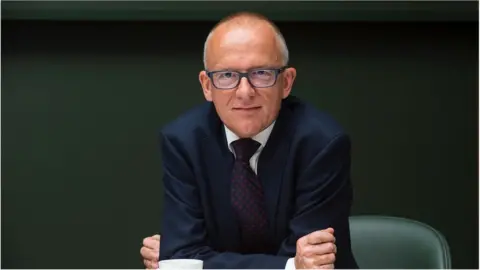 Metropolitan Police
Metropolitan PoliceSir Mark Rowley's professorial demeanour, and his gentle Birmingham accent, hide a steely determination - but he's likely to need all his resilience and skill in turning round the Metropolitan Police as he takes up his post as commissioner on Monday.
In 1993, six years into his now 31-year career, he and another unarmed officer chased a robber brandishing two knives and a gun into an alley, and tackled him to the ground.
The pair were commended for their bravery and - to this day - the Cambridge mathematics graduate emphasises that, like many UK police officers, he has never personally carried a gun, nor ever wished to, despite having commanded firearms operations.
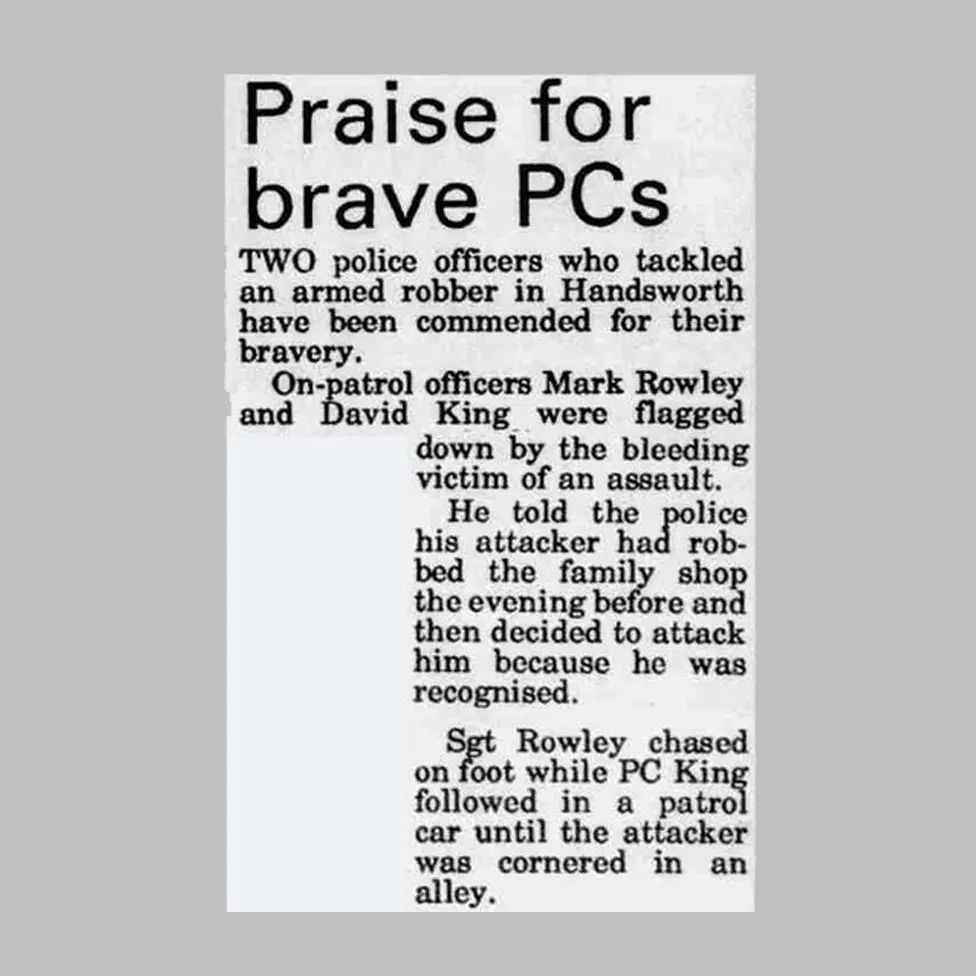 Birmingham Metronews
Birmingham MetronewsHe now faces a challenge that will test all of his bravery, persistence and strategic skills, to deliver the promise he gave when he applied for the job: "More trust, less crime, high standards".
His plans include new precision crime-fighting teams to get a grip on crime at a local level, and he will have to address strong concerns about the Met's culture.
The force he is taking over is facing a crisis of trust, is being closely monitored by the policing watchdog, and one of his first meetings will be with the inspectorate's "star chamber", the Policing Performance Oversight Group.
Policing 'nightmare'
The Met is the most high-profile force in the UK because it is by far the biggest, because of the international brand of Scotland Yard, and because of its national role in counter terrorism - but the last two years have been terrible for the London force.
The nightmare started when one of its own officers, Wayne Couzens, kidnapped and murdered Sarah Everard and the Met was then heavily criticised for using force to detain demonstrators for breaching coronavirus regulations, when a vigil in her memory became a rally.
Then there was a report into the failed investigation into the murder of Daniel Morgan, which suggested the Met was guilty of "institutional corruption", something it vigorously denied. And last autumn the inquest into the victims of the serial killer Stephen Port exposed some extraordinarily incompetent detective work.
The last straw came in February when an Independent Office of Police Conduct (IOPC) report into WhatsApp messages between a small group of officers at Charing Cross Police Station laid bare a culture of casual racism and joking about rape. This ultimately led to the resignation of Sir Mark's predecessor Dame Cressida Dick.
'Tougher than he looks'
For Richard Walton, who worked closely with Sir Mark as the Met's commander for counter terrorism, the new commissioner's excellent strategic skills and steely character are a good fit for the force.
He is a "great appointment, good news for Londoners, and bad news for criminals," Mr Walton told the BBC.
"He's gritty, he's resilient, he knows his mind, he is much tougher than he looks. He is not someone to sit back and wait for things to happen. He has a clear strategy on how to reduce crime in London."
Sir Mark will all need his leadership and analytical skills, plus possibly some luck, to turn things round at the Met. It will mean introducing a rigorous new culture and stronger discipline, but also getting the basics right, for example on burglary and on violence against women.
Last week, the new Prime Minister Liz Truss said "safer streets" were a priority for her government, and forces across England and Wales are currently under scrutiny for their performance.
Diana Fawcett, chief executive at the charity Victim Support, says regaining trust must be a top priority for the new Commissioner.
"We know from our work supporting victims of crime across London, that lack of trust in the police is a very real issue, especially amongst women," she said.
David Spencer, head of crime and justice at the centre-right think-tank Policy Exchange, and a former Met detective chief inspector, says strong measures are needed to overhaul a force that "has been in permanent crisis over recent years".
Mr Spencer said he believes "at least a quarter" of the Met's current top officers should be removed, and every local commander's performance reviewed, "with those not up to the job replaced".
Climbing the ranks
Sir Mark Rowley was born in Birmingham and went to Handsworth Grammar. His father ran a small engineering business, his mother was a teacher.
At Cambridge he studied mathematics (1983 -1986) and rowed for the St Catharine's College 1st VIII - but even before he went to Cambridge he knew he wanted to be a police officer. He was turned down by the Metropolitan Police because of his poor eyesight so he joined his local force, West Midlands Police, in 1987.
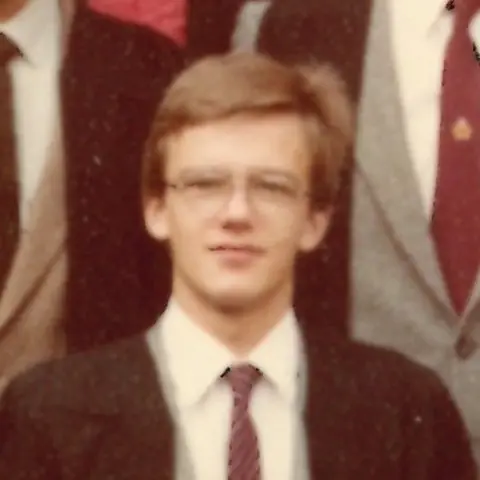 Lafayette Photography
Lafayette Photography In 1989, while he was still a probationer, he was beaten unconscious and had his nose broken while responding to a pub fight.
Soon after that he started a speedy climb through the ranks, pioneering some innovative ideas to tackle the 1990s burglary epidemic as a young detective, then joining the new National Criminal Intelligence Service (a forerunner of the National Crime Agency).
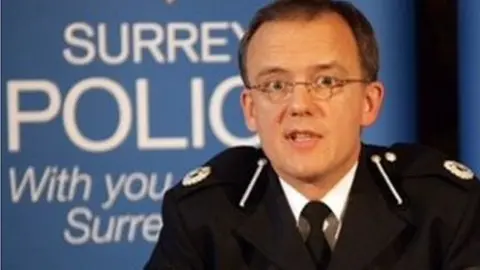 Press Association
Press AssociationThe next phase of his career was at Surrey Police, where was the chief superintendent in charge of West Surrey before being appointed Chief Constable in 2009. He was an early pioneer of what became known as neighbourhood policing, and his proposed precision crime-fighting teams are likely to be an updated more intelligence-led version of that model. At Surrey, as budgets shrank under austerity, he managed to increase the number of officers by 200 by thinking creatively and making cuts elsewhere.
Counter Terrorism
He first joined the Metropolitan Police as an assistant commissioner in December 2011, leading the force's response to the riots earlier that year. This led to him being shouted down on the steps of the Royal Courts of Justice.
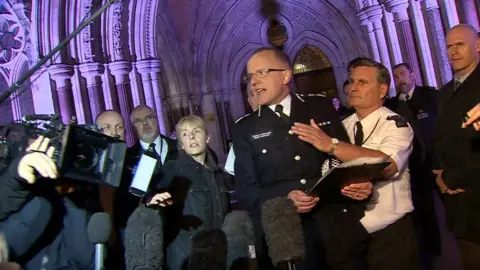
In the turbulent years 2014-2018, he became known to the UK public as the usually reassuring face in charge of Counter Terrorism Policing. The Islamic State group declared its caliphate in Syria and Iraq on his second day in the job.
He was in post when hundreds of British people, including 15-year-old Bethnal Green girls, went to join Islamic State. He was the man who had to steady the nation's nerves, giving live press conferences outside New Scotland Yard during the multiple attacks of 2017, as lives were taken by violent extremists on Westminster Bridge, at Manchester Arena, near London Bridge and in Finsbury Park.
He had spent three years leading the network set up to prevent such attacks, but in 2017 the extremists breached the defences time and again. Soon afterwards, he applied to lead the Metropolitan Police, but was overlooked in favour of Dame Cressida Dick, and retired from policing in 2018.
Now he is returning. During the intervening four years he has walked to Everest Base Camp and written a thriller - about a female counter-terrorism detective investigating multiple attacks by both far-right and Islamist extremists.
A former senior colleague joked: "He does have a weakness. He is a supporter of Aston Villa."
Additional reporting by Judith Burns.
